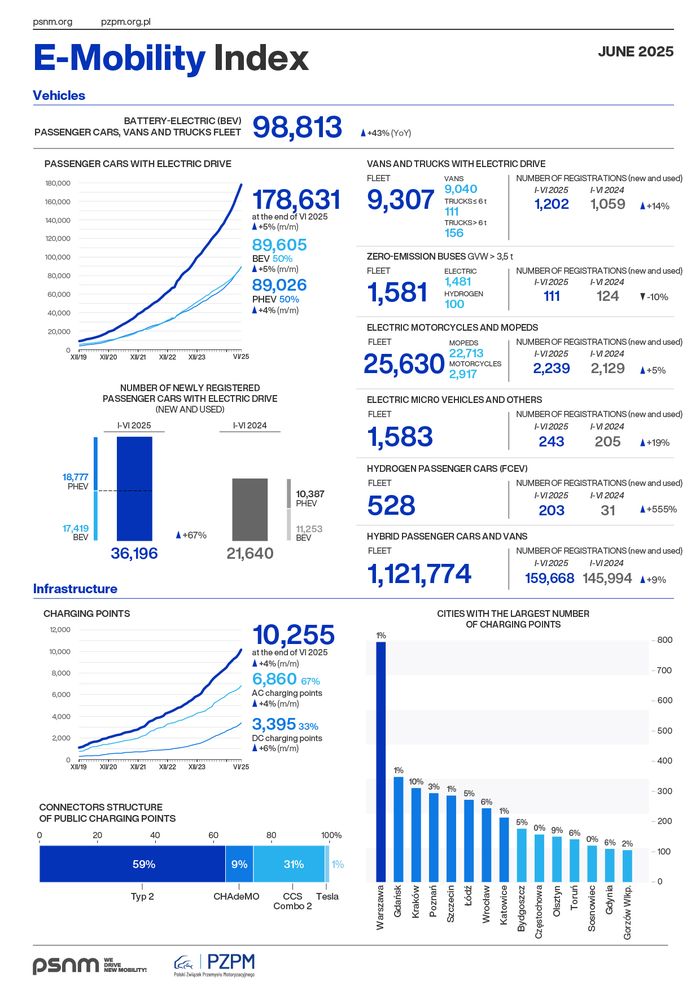Electromobility Counter: Over 10,000 Publicly Accessible Charging Points in Poland
- Oprac. M.K.
- Kategoria: English zone
According to data from the end of June 2025, a total of 98,813 fully electric passenger and commercial vehicles (BEVs) were registered in Poland. In the first half of this year alone, their number increased by 18,553 units – a 51% rise compared to the same period in 2024 – according to the Electromobility Counter launched by PZPM and PSNM.
At the end of June 2025, there were 178,631 electric passenger cars on Polish roads. The fleet of fully electric passenger vehicles (BEVs – battery electric vehicles) amounted to 89,605 units, while the fleet of plug-in hybrid electric vehicles (PHEVs – plug-in hybrid electric vehicles) reached 89,026 units. The number of electric delivery vans and trucks totaled 9,307 units. The fleet of electric mopeds and motorcycles also continues to grow, reaching 25,630 units by the end of June. The number of hybrid passenger and delivery vehicles rose to 1,121,774 units. By the end of last month, the fleet of zero-emission buses in Poland had increased to 1,583 units (including 1,481 fully electric vehicles and 100 hydrogen-powered vehicles).
In parallel with the growing fleet of electric vehicles, the charging infrastructure is also expanding. By the end of June 2025, there were 10,255 publicly accessible electric vehicle charging points operating in Poland. Of these, 33% were fast DC charging points, while 67% were slower AC charging points with a power output of less than or equal to 22 kW.
June marked yet another consecutive month with a record-high market share for electric passenger vehicles – nearly 8%. This is nearly three times higher than at the end of 2024, but still more than twice as low as the EU average. That is why it is so important to continue subsidies after the NaszEauto program ends in the middle of next year. A potential solution could be the social leasing program proposed by PSNM as part of consultations for the government's social and climate plan. This plan will determine the direction of funding from the Social Climate Fund (SCF) – an EU instrument aimed at combating transport exclusion resulting from the introduction of the new emissions trading system (ETS2). The proposed leasing model, based on 100% coverage of the initial fee and a monthly installment of approximately PLN 300–400 for a new car, fits perfectly with SCF goals by significantly increasing the accessibility of zero-emission transport. A similar program has already proven successful in countries such as France – says Jan Wiśniewski, Director of the PSNM Research and Analysis Center.
The record-breaking zero-emission vehicle registrations in recent months – including June – show how important it is to support this market. The launch of the subsidy program from the National Recovery Plan (KPO) clearly boosted the registration of zero-emission passenger vehicles. In this context, we welcome the announcement from the Ministry of Climate and Environment that a review of the applications will soon be conducted. We hope that the group of beneficiaries will be expanded to include individuals and sole proprietors who wish to purchase zero-emission delivery vehicles. While this does not guarantee full utilization of the program’s funds, it will undoubtedly provide a significant boost. The issue of expanding the group of beneficiaries to include companies remains unresolved – although the European Commission does not currently support this, we hope that the responsible ministries will reopen the discussion. I would also like to emphasize once again that the charging infrastructure is developing rapidly – by about 50% annually. Poland now has over 10,000 charging points – one-third of which are fast chargers. This is crucial, as many customers base their decision to purchase a zero-emission vehicle on the availability and quality of charging infrastructure – says Jakub Faryś, President of PZPM.
Source: Polskie Stowarzyszenie Nowej Mobilności




